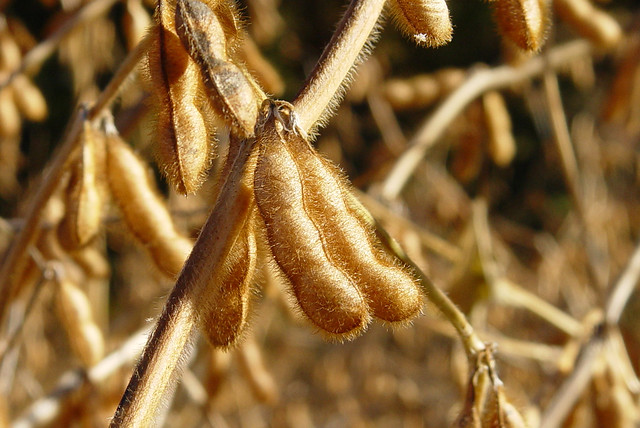 |
| Soybeans. CC photo by Scott Robinson on Flickr |
2013 may well go down as the year of the GM
reality checks.
Reality Check No.1
GM crops increase the use of toxic
chemicals in our food and in our environment.
In August, the US Department of Agriculture
quietly approved the first next-generation GM crop, Bayer's soya which is
resistant to 'Balance' herbicide containing 'isoxaflutole' (IFT).
IFT is classed as a “probable human
carcinogen”, and is linked to liver and thyroid tumours and foetal
toxicity. The herbicide is persistent in
the environment, including ground-water sources of drinking water.
Right behind IFT in the GM/pesticide
pipeline, a veritable “herbicide Armageddon” with matching GM crops is looming:
- Dow AgroSciences is awaiting approval of 2,4-D-resistant maize and soya. This herbicide has been linked to immune-system cancer and adverse reproductive impacts.
- BASF is preparing an imidazolinone-resistant soya. One form of this herbicide has been linked to bladder and colon cancer
- Syngenta has GM soya resistant HPPD inhibitors (related to IFT) which have been linked to toxic effects in the liver.
- Monsanto has its own GM soya and cotton resistant to Dicamba, a herbicide linked to cancer and developmental toxicity.
Reality Check No.2
GM crops are prone to disease and pests.
A “tidal wave” of Goss's wilt is washing
across the Corn Belt of America. Goss's
wilt is a bacterium which enters the plant through wounds caused, for example,
by extreme weather. It can cut yields by
a half and in 2013 is expected to affect 10% of the total crops. The blame is being laid on the biotech
industry:
- its constant focus on high-yields at the expense of the plants' immune-system and physical strength
- the adoption of Roundup-based no-till farming which leaves the corn-stalks and the bacteria in the soil
- the reduced crop rotation encouraged by GM-agriculture.
Also spreading through American
corn-growing states is root damage from Western corn rootworm. The corn with the problem is GM corn with self-generated 'Bt'
insecticide designed to kill this very pest.
Brazil is facing its own plague of pest
problems in the form of Helicoverpa (earworm).
This pest especially affects cotton, soya and maize (all dominated by GM
varieties) and also sorghum, beans and tomatoes. In the last season alone, the plague caused
losses of 10 billion Brazilian Real. The
root of the problem is the excess use of chemical pesticides and GM 'Bt'
insecticidal crops which have eliminated Helicoverpa's major natural enemy.
COMMENT
Gene technology is clearly fostering a simplistic approach to
agriculture which leaves pests and diseases laughing all the way to the
banquet.
Reality Check No.3
Gene pollution is out of control.
Check out GENE POLLUTION UPDATE 2013 -
November 2013
Reality Check No.4
Forewarned is not forearmed.
Reality Checks 1, 2 and 3 were predicted
before GM even hit the shelves.
Reality Check No.5
GM food safety testing still isn't
happening
One Scottish “pro-GM believer” a university
professor of plant physiology who has been highly vocal throughout the GM crop
era, recently asserted that “many hundreds” of GM feeding experiments have
demonstrated safety. His remarks were an
attempt to refute the signs of serious harm found in a life-long study of rats
fed a GM maize and the Roundup herbicide it accumulates[1].
According to the French food agency (ANSES)
only two comparable studies exist.
One of these found health problems, and the other is impossible to
evaluate because it's available only in Japanese.
Reality Check 6
The public (you) are being insulted.
As our food crops become increasingly
polluted, toxic and infested, we're told it's safe. But, the proof of safety is imaginary.
WHAT YOU CAN DO:
It's about time all these Reality Checks
were making GM change course. How about
some GM Reality Changes for 2014?
SOURCES
New Genetically Engineered Crop Will Sharply increase Use of Toxic Pesticide, a “Probable Human Carcinogen”, Center for Food Safety, 29.08.13
Tegan Wendland, Wisconsin's booming grape crop at risk from herbicide drift, www.wisconsinwatch.org, Wisconsin Center for Investigative Journalism, 8.09.13
GM Bt crop failures hit Brazil and US, Thin Ice, Issue 31, October 2013
Dr. Eva Sirinathsinghji, Bt Resistant Rootworm Spreads, Institute of Science in Society Report 31.10.11
Dr. Eva Sirinathsinghji, Farmers still Suffering from Bt Resistant Rootworm, Institute of Science in Society Report, 16.09.13
Stephanie Strom, A disease cuts corn yields, New York Times, 20.09.13
Leonardo Gottems, Brazil has lost 10 billion Real to Helicoverpa armigera, Agrolink, 18.07.13, and GM Watch 2013 articles
MDA warms farmers on appearance of the Helicoverpa caterpillar in crops, Ministry of Agricultural Development (Brazil), 9.08.13
Arpad Pusztai, Pusztai responds to Trewavas' attack, 7.03.02
Claire Robinson, Addressing claims on GM lab tests, Sunday Herald Letters, 6.10.13
No comments:
Post a Comment
Thanks for your comment. All comments are moderated before they are published.